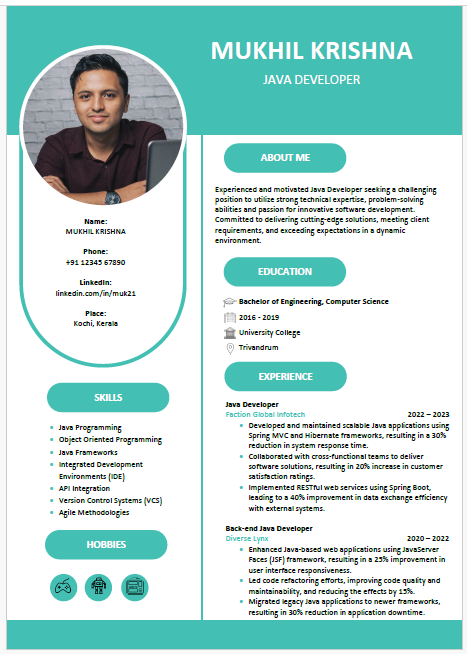Java Developer
Bachelor of Engineering, Computer Science

About this template
This is a template designed for an experienced Java Developer.
This is a template designed in Microsoft Word. Which will prove to be very helpful for experienced Java Developers. You can edit this template as per your requirement. You can add or remove details according to your profile.
Most common Technical skills for Java Developer :
A proficient Java Developer must possess a solid foundation in both core and advanced Java skills. At the core, understanding object-oriented programming (OOP) principles such as inheritance, polymorphism, encapsulation, and abstraction is essential. Proficiency in Java fundamentals, including syntax, data types, operators, control statements, loops, and exception handling, is crucial for writing efficient and error-free code. Additionally, a strong grasp of the Java Collections Framework, encompassing data structures like List, Set, and Map, is necessary for effective data manipulation. Understanding concurrency and multithreading, particularly the java.util.concurrent package, is vital for developing scalable and high-performance applications.
1. Advanced Java
Advanced Java skills further enhance a developer's capability to build sophisticated applications. Proficiency with Java 8 features, including the Streams API and lambda expressions, facilitates functional programming and efficient data processing. Knowledge of Java I/O, encompassing input/output streams, file handling, and serialization, is essential for managing data input and output operations. Java networking skills, such as socket programming and utilizing Java networking APIs, enable the development of networked applications.
2. Framework
Frameworks and libraries play a significant role in modern Java development. Expertise in the Spring Framework, including Spring Core, Spring Boot, Spring MVC, Spring Data, and Spring Security, is highly valued. These frameworks streamline the development of robust and scalable enterprise applications. Experience with ORM tools like Hibernate and the Java Persistence API (JPA) simplifies database interactions. Familiarity with build tools like Maven and Gradle is essential for managing project dependencies and automating the build process.
3. Web development
Web development skills are indispensable for Java developers involved in creating web applications. Proficiency in server-side programming with Java Servlets and JavaServer Pages (JSP) is fundamental. Additionally, knowledge of RESTful and SOAP web services, along with frameworks like JAX-RS and JAX-WS, is crucial for building and consuming web services. While primarily focused on the back end, a basic understanding of front-end technologies like JavaScript, HTML, and CSS is beneficial for full-stack development.
4. Database management
Database management skills are essential for Java developers. Proficiency in SQL and experience with relational databases like MySQL, PostgreSQL, and Oracle are necessary for data storage and retrieval. Familiarity with NoSQL databases such as MongoDB, Cassandra, and Redis is advantageous for handling unstructured data and scalable database solutions.
5. Integrated Development
Proficiency with development tools and environments significantly enhances productivity. Experience with Integrated Development Environments (IDEs) like IntelliJ IDEA, Eclipse, and NetBeans is essential for efficient coding and debugging. Knowledge of version control systems like Git is crucial for managing code changes and collaborating with team members. Familiarity with testing frameworks such as JUnit and TestNG ensures code quality through unit testing. Understanding Continuous Integration/Continuous Deployment (CI/CD) tools like Jenkins, GitLab CI, and Travis CI is important for automating the build, test, and deployment processes.
Conclusion
Modern Java developers benefit from knowledge of microservices architecture, which involves designing applications as a collection of loosely coupled services. Familiarity with Docker and Kubernetes for containerization and orchestration is valuable for deploying applications in scalable and portable environments. Experience with cloud platforms like AWS, Azure, and Google Cloud Platform (GCP) is beneficial for leveraging cloud services and infrastructure. Lastly, understanding security concepts, including authentication, authorization, and encryption, is crucial for building secure and resilient applications. These comprehensive skills equip Java developers to tackle diverse and complex projects in the ever-evolving tech landscape.